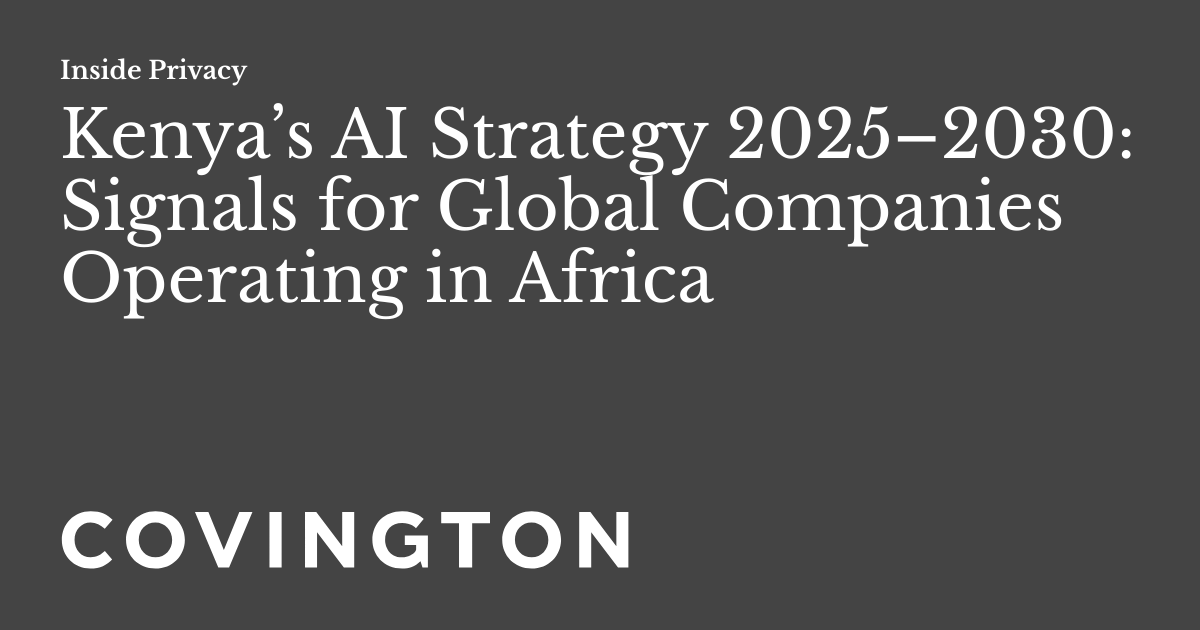Kenya’s AI Strategy for 2025–2030: Insights for Global Businesses in Africa

Kenya’s National Artificial Intelligence Strategy (2025–2030)
Kenya recently launched its inaugural National Artificial Intelligence Strategy (2025–2030), marking a significant milestone for the continent. This comprehensive strategy outlines a governmental vision aimed at fostering ethical, inclusive, and innovation-driven adoption of AI technologies. As Kenya embarks on its digital transformation journey, the strategy is structured to attract global companies interested in developing, deploying, or investing in AI across Africa.
Key Components of the Strategy
While the strategy primarily focuses on Kenya, it takes into account a broader trend— the adaptation of global AI governance norms in emerging markets. Below are the principal elements outlined in the strategy that will influence technology governance both within and beyond Kenyan borders.
Data Governance and Sovereignty
Kenya is keen on ensuring AI development adheres to national standards, emphasizing local data environments. The strategy highlights the importance of data privacy, cybersecurity, and ethical considerations as foundational elements of the AI ecosystem. For international companies utilizing cloud services or engaging in cross-border data transfers, this focus on localization suggests potential pressures to adapt to new consent and regulatory standards.
Sector-Specific Use Cases
Key industries identified as focal points for AI implementation include:
- Healthcare
- Agriculture
- Financial Services
- Public Administration
These sectors present unique opportunities and challenges for companies. Businesses in health technology and life sciences, for example, need to monitor how regulatory bodies interpret ethical guidelines, especially when AI informs clinical decisions or diagnostics.
Public-Private AI Infrastructure Development
The strategy envisions the growth of digital infrastructure, such as data centers and cloud-based resources, alongside national research hubs. This expansion represents commercial prospects but may lead to new localization requirements and procurement restrictions. For telecommunications providers and hyperscale cloud services, the impact could be substantial.
Future Legal Frameworks
Although the strategy itself is not legally binding, it lays the groundwork for forthcoming policies revolving around governance and regulatory oversight of AI technologies. Stakeholders involved in AI risk assessment, potential litigation, and compliance should stay informed about future legislative drafts and guidelines as they emerge.
Regional and International Collaboration
The Kenya AI Strategy 2025–2030 stands out as one of the most comprehensive national frameworks in sub-Saharan Africa. A significant focus is placed on regional and international cooperation. The strategy closely aligns with the objectives of the African Union’s continental AI agenda and aims to coordinate effectively with regional bodies such as the East African Community (EAC) and Smart Africa initiatives.
For global firms engaged in public policy or legal matters, this strategy serves as an important indicator of how different African governments plan to approach AI governance. Emphasizing responsible innovation, national data ecosystems, and ethical principles, the strategy suggests a movement towards systematic oversight of AI technologies.
As Kenya begins to implement these new guidelines, companies must evaluate how their AI models, privacy frameworks, and infrastructural plans comply with these developing regulatory expectations. Engaging with relevant authorities and adjusting operational strategies may become necessary to meet the evolving landscape of AI governance in Kenya and the wider African region.




